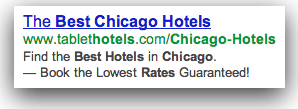Barry Schwartz at Search Engine Land recently wrote about a fascinating hint at Google Subject Authority Ranking from Google’s Matt Cutts in a recent Google Webmaster Help video (video will start at the relevant portion.)
Every time I do a Hangout or meetup about SEO and there’s a Q&A, it’s obvious from the questions that most site owners are still living in 2007. They’re still fixated on keywords, both on-site and in links. Keywords are still important (see AJ Kohn’s “Keywords Still Matter“). But the longer you continue to focus on keywords alone as your strategy, the farther behind you will fall in search marketing.
In this video, Matt Cutts says, “We are doing a doing a better job of detecting when someone is sort of an authority in a specific space. It could be medical, it could be travel, whatever. And trying to makes sure that those rank a little more highly, if you are some sort of authority or a site that according to the algorithms we think might be a little bit more appropriate for users.”
(Important to note here that in the context of the question asked, by “someone” Matt means “a web site.” This isn’t addressing Authorship/Author Rank, but I take it as an indication that Google wants to get to that as well.)
In other words, Google is actively pursuing figuring out which sites are viewed as most authoritative in a particular topic, and then that high authority will in and of itself serve as a search rankings booster. More below on my personal speculation of how Google might go about doing that, at least in part.
The takeaway from Matt’s quote is that you might do all the right technical things with optimizing your site and getting keywords in the right places, and still get left in the dust if you aren’t establishing a reputation as a “subject authority.”
The trick is…how do you do that? Say hello to the importance of content connected to social. In my mind these are the two elements you must have.
Content: The Demonstration of Subject Authority

Not an ad – just illustrating my point in the text!
Subject authority isn’t something you claim by plastering the subject keyword across your web site. Think about short-form advertising, such as AdWords ads. Every business is the “best” or “cheapest” or “lowest rates” or “highest quality.” The potential customer begins to become deaf and blind to such claims. When everyone says they are the best, how do we know who really is?
Well-written, well-researched content that addresses specific needs and concerns of potential customers, that answers their questions or teaches them something, establishes an aura of authority around your business. It’s “going public” with your expertise and showing it off where people can see it.
Think of your content as the demo guy at a state fair booth selling “the kitchen gadget of the future!” The salesman doesn’t just lay out the Gadget of the Future! on a table for people to gaze at. No, he’s putting on a show, a continuous demonstration. He’s showing how it slices, it dices, it makes julienne fries in just seconds! (Does anyone have any idea what julienne fries are?). It’s one thing for the bottle to say, “Removes any stain!” But when the salesman spills wine on the white shirt and then wipes away the stain in seconds with his miracle stain remover, well that’s when we line up and reach for our wallets.
Of course, you’d better first make sure you really are an expert and that your product lives up to your knowledge about it:
Your content may not “core a apple,” but it should clearly demonstrate that you know what you’re talking about. It should build confidence and trust in your audience so that when they are ready to buy or fill out that lead form, they feel good and confident about doing it with you.

Marcus Sheridan, the Sales Lion (and friend)
Can authoritative content really make that much difference. Ask Marcus Sheridan, the “Sales Lion.”
In 2008 the recession hit his River Pools pool installation business in northern Virginia hard. By early 2009 his business was on the brink of bankruptcy. Acting out of more desperation than genius, Marcu decided to have a go at “that Internet thing.” He brainstormed every question he’d ever heard a prospect or customer ask him about pools and spas, and then began writing blog posts answering each of those questions. Soon he had hundreds of pages of authoritative content. And Google began connecting people to that content. Sales went up to higher than ever before, in the midst of a recession.
Along the way Marcus discovered an amazing fact from his analytics. Visitors to his site who had read at least 30 pages of information on his site were 80% likely to become a paying customer. Compare that to his industry average closing rate of 10%. And the average time of their in-home sales calls dropped dramatically, as a majority of their prospects has already answered most of their own questions from the blog posts on the River Pools web site. (From the foreword to Youtility: Why Smart Marketing Is about Help Not Hype by Jay Baer.
Moreover, as we move into the age of semantic search, your web content will not only help visitors understand what you are authoritative in, it will help search engines. As Matt Cutts hinted in the quote above, Google is getting better and better at figuring out who the authorities are in a given subject. But before they can _rank_ you for a subject, they have to have a good idea of _what_ subject(s) you should be ranked for. Semantic search is all about the machine learning that is able to analyze human language much as we humans do, to suss out the context and relational meanings. The more and better content you produce, the more clues you’re providing the search engines about who you are and what you’re about.
Social: The Promotion of Subject Authority
 But just because you built it doesn’t mean they’ll come. In days of yore (read: just a few years ago), site owners had to build content and then try to get links associated with it so search engines would a) find and index the content and b) come to see it as authoritative. Getting those links is long, hard work however, which is why so many resorted to buying them, or engaging in other blatant schemes to get them.
But just because you built it doesn’t mean they’ll come. In days of yore (read: just a few years ago), site owners had to build content and then try to get links associated with it so search engines would a) find and index the content and b) come to see it as authoritative. Getting those links is long, hard work however, which is why so many resorted to buying them, or engaging in other blatant schemes to get them.
The social web, though, has provided a whole new avenue through which you can let the world know about how awesome you are in your area of expertise. There you can not only passively demonstrate authority through content creation, but “slice, dice, and julienne fries” in real time as you help people and answer their questions. And you then gain opportunities to lead them back to your home base, where your richest content awaits to confirm what their social interactions with you have led them to suspect: you are the real deal.
But wait, there’s more! (I’m kind of on a infomercial theme in this post, no?) Those social interactions with you and your content can provide a rich web of confirmatory signals around you and your content. Google doesn’t want just passive web links pointing at you. They want real people recommending you and sharing what you produce. Why do you think Google built Google+? They want and need that signal, and you need to make sure you’re hooked up to give it to them.
Just a Small Town Boy…
When we take a step back from all this whiz-bang technology and look at it in a human way, what’s going on here is really not all that different from the way things have always been done in every small town. Over time, people in town come to know who the butchers, bakers, and candlestick makers are that can be trusted, that know their craft, and who won’t rip you off. They experience it first hand, and then they find ways to share the information with their neighbors. In some ways, the search engines want to bring back that small town, where you can see the baker getting up early to make sure that the dough is prepared fresh (content), and where the buzz in the neighborhood (social) lets everyone know where you should get your donuts.


The thing I like most about your post Mark is this comment: “…look at it in a human way…”. Time and time again we talk to clients who only really want to know about what can be done technically to improve their performance online. But as you say, things haven’t changed all that much; people still want to interact with each other and they still buy things for the same reasons they did 50 years ago. Changing technology doesn’t really change motivations, just the medium.
Cheers
Chris
One of the places this gets sticky is when we’re talking about an individual vs a brand (sometimes these overlap entirely). Does Google see (conjecture please) Marcus Sheridan or River Pools as the authority/expert? Can Marcus effectively be a swimming pool expert and an online marketing expert (re: Sales Lion)? Seems Google could have a little trouble sorting out this entity.
I enjoyed the story of the Pool company owner who had great success with answering customer questions. Thoughtful commentary via Blogging designed to really help our customers and clients – great way to reach out and establish authority on a subject. Great article – thank you for sharing.
This is so much the story of what I try to help clients do or do for them. We need to share clearly with people the information that is the most help to them. They will most likely, in return, be devoted to helping us succeed as well. Thanks Mark for a great post to share. I know many who are starting out and this will help to take some of the fear away. I posted this on Google+ with a focus on the story from the guy who went from bankruptcy by just sharing great content.
Subject authority! I like how you’ve explained it. What will really make guys stick with you is the solution you’ll offer; the substance and flesh in your product.
Thanks for a well written article on subject authority. It just re-focused my actions and brought them back on target and that is what I look for in stellar content.
Thanks Mark. I have enjoyed your posts as I have been trying to learn more about Google + since Facebook appears to be forcing people to pay to reach folks who like our pages (shouldn’t it be assumed if they like a page they want to see it’s posts organically and can unlike if it’s too much?)
I find it very troubling that Google wants to pigeon-hole people’s authority. I think they do that because it works for an algo– though not real life “judgments.” The people I respect the most have MANY areas of authority. No way an algo could pick up on their brilliance, as their simply aren’t enough data-rice points from these folks in the digital world. Only a person could get why what they say is so meaningful
Well, this is really cool post which you have given here! I like it!
I really loved this post, thanks for this!
Hi mark,
Getting your name, company or site as brand/authority creates a fabulous impact to our householders and social life. You have posted a fantastic article regarding this. I hope you won’t disappoint me again in future with the same kind of topic with some new exciting ideas. 🙂
“Over time, people in town come to know who the butchers, bakers, and candlestick makers are that can be trusted, that know their craft, and who won’t rip you off…” Great analogy, it’s shame there’s going to be hundreds of butchers in one town being given customers recommendations by one stupid robot.
mark,
This is a great piece.. I’m still not convinced that author rank is anywhere near the top of search engine ranking factors. I’m not saying it won’t continue to gain measure, but .. we’ll just have to wait and see.
Great post! These are all great suggestions to help make your company known as an industry authority, but you are also creating great content to help boost your SEO in the process. One project I have personally worked on and seen success in is to deploy a mini website. It is a great way to reach out and communicate with your audience.
Kindly Regard’s
Shruti